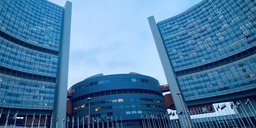As preparations for the 2022 Internet Governance Forum gather momentum, MAG member Chris Buckridge checks in on the discussions and developments shaping this year’s event and the IGF ecosystem.
In late 2021, I joined the Internet Governance Forum (IGF) Multistakeholder Advisory Group (MAG). And for an opening sentence, there’s already a fair bit there to unpack…
The IGF is a multistakeholder platform for discussion of Internet governance. It’s coordinated by the United Nations and has been hosting annual meetings since 2006. The MAG is like the IGF programme committee - a group of around 40 people appointed by the UN, coming from different stakeholder groups, who determine the content and format of each year’s event, as well as guiding many of the activities that take place between the annual meetings (known as intersessional activities). There are also a number of MAG Working Groups, many of which include both MAG members and others with an interest. The role of these Working Groups is to provide input to the MAG discussions or carry out specific tasks on behalf of the MAG (like drafting calls for proposals). The MAG meets online pretty regularly, and its discussions are open to the public (as is the archive of its mailing list), but for the past two years, it hasn’t had the chance to meet regularly in person. That will (hopefully) change in July, when the second MAG Meeting and Open Consultation of 2022 takes place in Geneva.
Like everything else in the world, the last two years have been a period of disruption and challenge for the IGF. Following a fully remote event at the end of 2020, in 2021 the IGF was held as a hybrid event - a physical meeting in Poland, with fully integrated remote participation.
The COVID period has also not prevented progress and development in Internet governance more generally, and particularly in the context of the United Nations itself. Very little in the United Nations is truly static, but with a highly motivated UN Secretary-General, the last few years have seen an uptick in the pace of development in relation to Internet governance (or “digital cooperation”). Kicking off with the formation of a High-level Panel on Digital Cooperation in June 2018, we’ve seen new developments coming thick and fast - the publication of that Panel’s report, ‘The Age of Digital Interdependence’ in June 2019, the Secretary-General’s own ‘Roadmap for Digital Cooperation’ in June 2020, an ‘Options Paper for the Future of Global Digital Cooperation’ in September 2020, and the Secretary-General’s ‘Our Common Agenda’ report in September 2021, which proposes, among its many recommendations, the creation of a Global Digital Compact and ‘Summit of the Future’ to be held in 2023. Meanwhile, coming out of recommendations in the ‘Roadmap’ (and the ‘Options Paper’), the UN has created an Office of the Secretary-General’s Envoy on Technology (with an actual Envoy to be appointed shortly), and an IGF Leadership Panel (which will also be announced shortly). And this is all happening alongside the pre-existing institutional schedule, which is building towards a 20-year follow-up to the World Summit on the Information Society (WSIS+20) in 2025, at which the mandate of the IGF itself will be renewed (or not!).
It’s a lot.
So let’s take it back to some practicalities. Like, where are we in May 2022? And what comes next?
We’ve had a few IGF-related events already this year, including the first Open Consultation/MAG Meeting that was held remotely in February. Ahead of that (in fact, coming quickly after the 2021 IGF that was held in December), the community was asked to provide feedback on the 2021 event and preparatory process and on possible themes for the 2022 IGF to consider. While there were certainly some complex discussions around these topics, the outcomes were relatively straightforward.
On the stocktaking issues, there was strong support for continuing (and making efforts to improve) the hybrid approach (facilitating both physical and remote participation). There was also a general message from respondents that the IGF’s annual event should have a more focused approach in its agenda, that there should be further attention given to coordination with national and regional Internet governance initiatives, and that the IGF should work to facilitate multistakeholder input on the range of other UN digital cooperation activities.
On this last point, the MAG agreed at the February meeting that the 2022 IGF (which will take place in Addis Ababa from 28 November to 2 December) would be structured around five themes, aligned with the themes outlined for the Global Digital Compact. The IGF 2022 themes are as follows:
- Connecting All People and Safeguarding Human Rights
- Avoiding Internet Fragmentation
- Governing Data and Protecting Privacy
- Enabling Safety, Security and Accountability
- Addressing Advanced Technologies, including AI
The decision to adopt this structure was not a straightforward one - the IGF (and the MAG) is fiercely proud and protective of its multistakeholder approach and its autonomy in responding to Internet governance issues as they evolve. There were concerns about adopting a thematic structure essentially laid out by a different (arguably much less multistakeholder) UN process, but it was agreed finally that the Global Digital Compact is potentially a significant event for global Internet governance, and it is vital that the multistakeholder community be able to contribute and help shape this document. By aligning the IGF 2022 themes, a more straightforward path is established to feed IGF outputs into the GDC development process.
In more recent developments, and perhaps in consideration of the rapid developments happening in and around the IGF ecosystem, the IGF Secretariat convened an Expert Group Meeting (EGM) in New York at the beginning of April. Bringing together an invited group of experts (including some current and past MAG members), the group held discussions about how some of these new structures (including the Leadership Panel and the Envoy on Technology) would cooperate and about the longer-term strategy for the IGF itself. If a much deeper dive on these issues sounds interesting, watch out for a public report from this meeting, to be published in the coming weeks.
In the meantime, we have come to the “call to action” part of this blog post - a call for workshop (and other session) proposals for inclusion in the 2022 IGF was recently launched, with a deadline of 3 June 2022. So if you have thoughts on issues or topics that could be addressed in a multistakeholder discussion (and that can fit into one of the themes noted above), this is your opportunity!
After two years of radically changed and increased global usage of and reliance upon the Internet, at a moment of tragically escalating geopolitical tensions, and with a huge range of new structures and initiatives in play, it’s difficult to overstate how significant this period may be for Internet governance. Our understanding of the Internet, the ways in which we use it, and the steps we take to maintain it are all coming under renewed scrutiny, and the outcome is far from clear. So my personal call to action is this: a multistakeholder approach relies on the full range of “multistakeholders” showing up for the discussion. At the RIPE NCC, we’ll be looking at how we can contribute, but we’re also always happy to support members of our community in bringing issues of concern to the IGF (or regional Internet governance venues) - if that sounds like you, please don’t hesitate to reach out!
I look forward to seeing some (hopefully lots) of you in Addis Ababa or online at the IGF 2022 later this year!







Comments 1
Comments are disabled on articles published more than a year ago. If you'd like to inform us of any issues, please reach out to us via the contact form here.
Chris Buckridge •
I noted in the article that a report from the Expert Group Meeting held at the beginning of April was soon to be published. It's now online, and open to public comment: https://www.intgovforum.org/en/content/report-from-expert-group-meeting